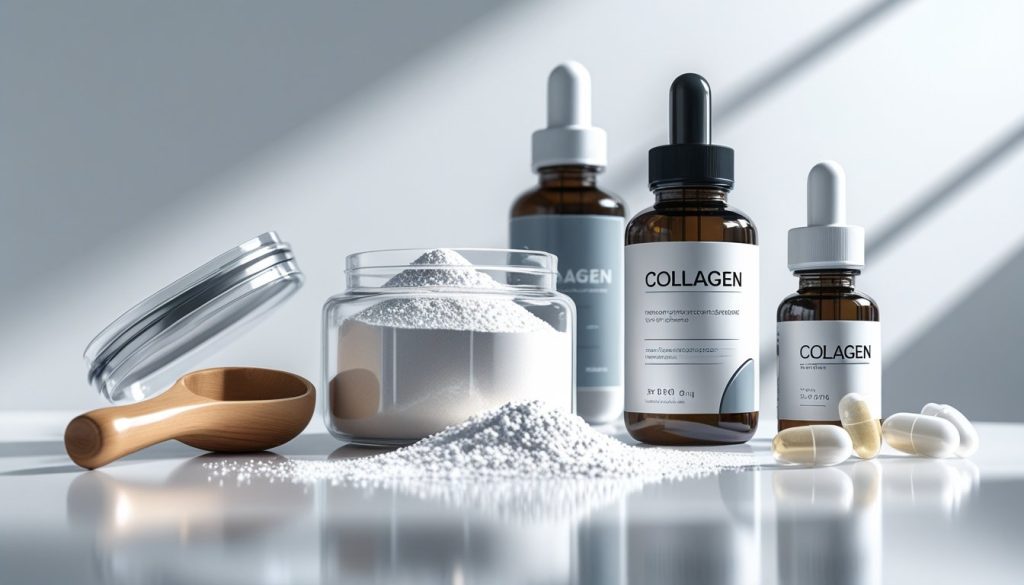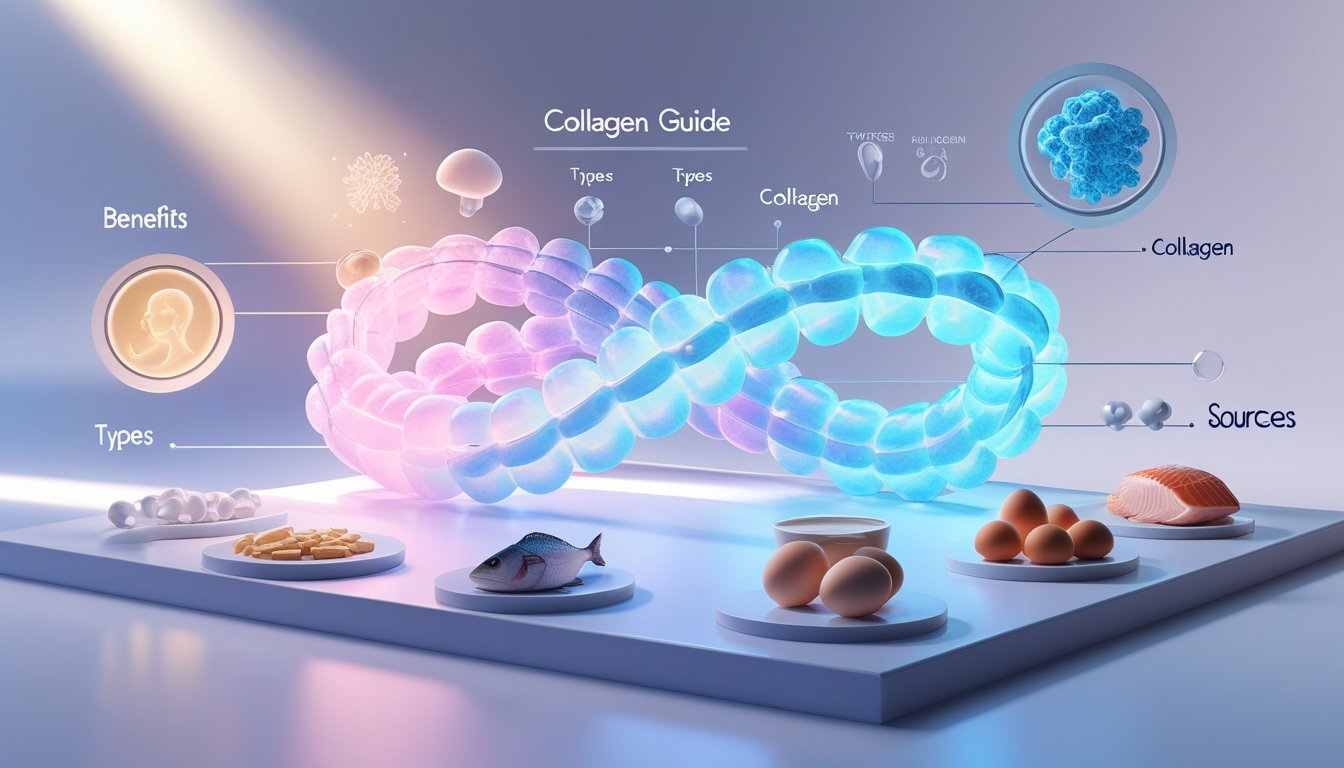Collagen is the most abundant protein in the human body, comprising approximately one-third of our total protein content and serving as the fundamental building block for skin, bones, joints, and connective tissues.
This remarkable structural protein has captured the attention of health enthusiasts, researchers, and consumers worldwide, particularly as we seek natural ways to maintain youthful skin, strong bones, and flexible joints as we age.
Understanding the role of Collagen in our bodies becomes increasingly crucial as natural collagen production begins to decline around age 25, leading to visible signs of aging and potential joint discomfort.
The global collagen market has experienced significant growth in recent years, with numerous supplements, foods, and beauty products promising to replenish the body's collagen levels and counteract the effects of aging.
Understanding Collagen: The Body's Structural Foundation
Collagen represents a sophisticated structural protein characterized by its unique triple-helix configuration, where three parallel polypeptide strands coil together in a left-handed formation to create a right-handed triple helix1.
This elegant molecular architecture provides Collagen with its exceptional strength, stability, and ability to maintain the structural integrity of various tissues throughout the body.
The defining feature of Collagen lies in its repeating amino acid sequence of glycine-X-Y, where X and Y can be any amino acid. However, proline and hydroxyproline frequently occupy these positions1.
This specific arrangement allows for the tight packing necessary to form the characteristic triple helix structure that gives Collagen its remarkable properties.

The Science Behind Collagen Stability
The thermal stability and mechanical strength of Collagen derive from multiple factors, including stereoelectronic effects and preorganization, which play crucial roles in maintaining the protein's structural integrity.
Interstrand hydrogen bonds form the backbone of collagen stability, with each N-H(Gly)⋯O=C(Xaa) hydrogen bond contributing approximately -2.0 kcal/mol to the overall stability of the triple helix1.
This remarkable stability explains why Collagen can maintain its structural properties for decades within our bodies, with Type II collagen in cartilage having a half-life of approximately 25 years6.
Such longevity makes Collagen an ideal structural protein for tissues that must withstand constant mechanical stress and maintain their integrity over time.
Comprehensive Guide to Collagen Types and Their Functions
The human body produces at least 28 different types of Collagen, each serving specific functions and locations throughout our anatomy.
Understanding these various types helps explain why different collagen supplements target different health concerns and why certain sources may be more beneficial for specific purposes.
Major Collagen Types and Their Primary Functions
Collagen represents the most abundant form, comprising over 90% of the body's total collagen content.
Fibrillar Collagen provides structure to skin, tendons, bones, ligaments, and blood vessels. Collagen provides strength to bones, elasticity to skin, and flexibility to tendons and ligaments.
Type II Collagen primarily exists in cartilage, particularly the hyaline cartilage found in joints and the nucleus pulposus of intervertebral discs6. This type offers exceptional stability and longevity, making it crucial for maintaining joint health and mobility throughout life. Type II collagen supplements often target joint pain and arthritis symptoms9.
Type III Collagen commonly appears alongside Type I Collagen in the skin, blood vessels, and internal organs. This type plays a vital role in wound healing and tissue repair, with fibroblasts initially producing Type III collagen during the first week of healing before gradually replacing it with Type I Collagen over 18 months6.
Type IV Collagen forms the foundation of basement membranes, creating the structural framework that separates different tissue layers. Network-forming Collagenagen provides essential support for epithelial and endothelial cells.
Type V Collagen appears on cell surfaces, in hair, and placental tissues, contributing to the regulation of collagen fibril diameter and tissue organization. 4
Specialized Collagen Categories
Beyond the major types, collagen classifications include several specialized categories:
- Fibrillar collagens (Types I, II, III, V, XI) form the classic rope-like fibers
- FACIT collagens (fibril-associated collagens with interrupted triple helices) help organize and stabilize collagen fibrils
- Network-forming collagens create sheet-like structures in basement membranes
- MULTIPLEXIN collagens contain multiple triple helix domains with interruptions4
Natural Sources of Collagen: Maximizing Dietary Intake
While collagen supplements have gained popularity, numerous natural food sources support the body's collagen production processes. Understanding these sources enables a more comprehensive approach to maintaining healthy collagen levels through a balanced diet.
Animal-Based Collagen Sources
Bone Broth stands as one of the richest natural sources of bioavailable Collagen. Made by collagenizing animal bones and connective tissues for extended periods, bone broth extracts gelatin. It provides essential amino acids, such as glycine and proline, which are necessary for collagen synthesis.
A daily cup of homemade bone broth can provide Collagen while supplying minerals and other nutrients that support overall health.
Fish and Marine Sources offer highly bioavailable marine collagen, particularly from fish skin and scales5. Marine Collagen demonstrates superior absorption compared to other animal sources and consists primarily of Type I Collagen, making it an excellent choice for promoting skin health and elasticity. Salmon skin, sardines, and other fish contain both Collagen and omeCollagen acids that support skin health.
Chicken and Poultry provide significant amounts of Type II collagen, especially in cartilage, skin, and connective tissues. Chicken feet, often overlooked in Western diets, are comparable to Collagen and can be incorporated into broths and stews. Organic, free-range chicken provides the highest quality collagen, free from harmful additives.
Beef and bovine sources primarily supply Type I and Type III collagen from hides, bones, and connective tissues. Cuts like short ribs, oxtail, and other tough cuts with significant connective tissue provide more Collagen than lean. Grass-fed beef offers superior nutritional profiles and cleaner collagen sources.

Collagen-Supporting Foods
WplaCollagena contains Collagen directly. Collagen foods support the body's natural collagen production through essential nutrients and cofactors.
Vitamin C-rich foods play a crucial role in collagen synthesis, as vitamin C enables the formation of pro-collagen, the body's precursor to collagen5. Citrus fruits, berries, bell peppers, and leafy greens provide a rich source of vitamin C to support natural collagen production.
Amino Acid Sources supply the building blocks necessary for collagen synthesis. Egg whites provide proline, while dairy products offer both proline and glycine5. Legumes, nuts, and seeds contribute various amino acids that support collagen formation.
Mineral-rich foods support collagen production through essential cofactors that promote its synthesis. Cashews provide copper, which plays a crucial role in the formation of Collagen. Collagen and elastin supply zinc, a vital component in the repair of these proteins. Garlic contains sulfur compounds that may help prevent collagen breakdown, while also providing taurine and lipoic acid to rebuild damaged collagen fibers.
Evidence-Based Health Benefits of Collagen
Scientific research has revealed numerous potential benefits of collagen supplementation and adequate collagen intake, though the quality and strength of evidence vary across different health claims.
Skin Health and Anti-Aging Effects
Collagen supplementation shows promise for improving skin health and reducing visible signs of aging. Research demonstrates that both oral and topical collagen supplements may help delay the aging process, with studies showing improvements in skin hydration, elasticity, and overall appearance8.
A significant study involving 72 women aged 35 and older found substantial improvements in skin hydration, elasticity, roughness, and density after taking collagen peptides with vitamin C and zinc for 12 weeks compared to a placebo group9. Collagenagen involves Collagen providing Collagential components for both elastin and collagen production, while binding to fibroblast receptors in the dermis to stimulate elastin and hyaluronic acid production.
Oral Collagen demonstrates superior absorption compared to topical applications due to its lower molecular weight, which allows for better distribution across tissues. Studies suggest that oral collagen intake enhances the moisture content in the stratum corneum and improves skin elasticity, while reducing wrinkles and roughness.
Joint Health and Mobility Support
Collagen's role in cartilage, bones, and connective tissues makes it a logical target for supporting joint health. Type II collagen, found primarily in cartilage, may help maintain joint function and reduce pain associated with osteoarthritis.
A randomized, double-masked trial involving patients with osteoarthritis found that those who received 10 grams of Collagen daily experienced significant pain reduction and improved physical activity compared to the placebo group. The mechanism likely involves providing raw materials for cartilage repair and maintenance while potentially reducing inflammation in joint tissues.

Bone Density and Skeletal Health
Collagen comprises the majority of bone structure, providing the framework upon which minerals deposit to create strong, resilient bones9. As we age, declining collagen production contributes to a reduction in bone density and an increased risk of fractures.
Research suggests that collagen supplementation may help conserve bone mass and offer osteoprotective properties9. The mechanism involves providing essential amino acids for bone matrix formation while potentially stimulating osteoblast activity and reducing bone resorption.
Studies indicate that adequate collagen intake, combined with appropriate calcium and vitamin D levels, may help maintain bone density and reduce the risk of osteoporosis, particularly in postmenopausal women who experience accelerated bone loss.
Cardiovascular and Metabolic Benefits
Emerresearch suggests Collagenslagen may offer cardiovascular benefits through its role in blood vessel structure and function. Type III collagen, found in blood vessels, helps maintain arterial elasticity and strength6. Adequate collagen levels may support healthy blood pressure and reduce the risk of arterial stiffness.
Some studies suggest that collagen peptides may help improve cholesterol profiles and support heart health, although further research is needed to establish definitive cardiovascular benefits.
Collagen Supplements: Types, Forms, and Effectiveness
The supplement industry offers a wide range of collagen products, each with distinct characteristics, absorption rates, and targeted benefits. Understanding these differences helps consumers make informed decisions about supplementation.
Hydrolyzed Collagen vs. Undenatured Collagen
Hydrolyzed Collagen, also known as collagen peptides, consists of short chains of amino acids through the enzymatic breakdown of larger collagen molecules. This processing improves bioavailability and absorption, making Collagengened Collagen the most common form in supplements.
Undenatured Type II collagen maintains its original molecular structure and may offer specific benefits for joint health by potentially modulating immune responses in cartilage3. While also broken down during digestion, Collagen may provide pro-Collagen signaling benefits before complete breakdown.
Supplement Forms and Dosage Considerations
Collagen supplements come in various forms, each with distinct advantages and considerations:
Powders and Liquids typically provide higher collagen concentrations per serving and offer better absorption compared to tablets or gummies3. These forms allow for easy mixing into beverages or foods and usually contain 0.5- 1 g of Collagen per serving.
Tablets and Capsules offer convenience but may contain lower collagen amounts per serving and often include fillers or binding agents3. These forms work well for consistent daily supplementation but may require multiple pills to achieve therapeutic doses.
Gummies and Chewables appeal to those who dislike powders but often contain added sugars and provide lower collagen concentrations3. While convenient, these forms may not deliver optimal collagen amounts for therapeutic benefits.

Quality Considerations and Source Selection
When choosing collagen supplements, several factors influence quality and effectiveness:
Source Quality matters significantly, with grass-fed bovine, wild-caught marine, and organic chicken sources generally offering superior nutritional profiles and fewer contaminants2. Sustainable sourcing practices also ensure environmental responsibility and long-term availability.
Processing Methods affect bioavailability and purity. Look for supplements that use gentle processing methods to maintain peptide integrity while ensuring proper hydrolysis for optimal absorption.
Third-party testing assures purity, potency, and safety. Reputable manufacturers conduct independent testing for heavy metals, contaminants, and accurate labeling.
Addressing Common Myths and Marketing Claims
The collagen industry faces significant challenges with misleading marketing claims and consumer confusion about product effectiveness and authenticity.
The “Vegan Collagen” Controversy
One of the most significant misconceptions involves “vegan col. Collagen is exclusively animal-derived and is found in skin, bones, and connective tissues. Currently, no commercially available plant-based or fermentation-derived collagen exists at scale.
Products marketed as “vegan collagen” actually contain collagen precursors or boosters—ingredients that support natural collagen production rather than providing actual Collagen. While Collagenoducts may offer benefits through vitamin C, amino acids, and other nutrients that support collagen synthesis, they do not contain Collagen itself.
Responsible Marketing Practices include clear labeling, such as “supports collagen production,” rather than implying the product contains Collagen. TranspCollagen ingredient lists should highlight collagen precursors, such as vitamin C, silica, and amino acids, while providing a scientific rationale for their inclusion.
Regulatory Oversight and Health Claims
In the European Union, no health claims for collagen supplements have been approved due to the lack of high-quality evidence. The European Food Safety Authority determined that the presented health claims lacked adequate scientific support, were poorly defined, and relied primarily on animal and laboratory studies rather than human clinical trials.
This regulatory stance underscores the importance of realistic expectations when using collagen supplements and emphasizes the need for ongoing research to establish definitive health benefits.
Evidence Quality and Study Limitations
While some studies show promising results for collagen supplementation, many suffer from limitations, including small sample sizes, short duration, and industry funding. The placebo effect may also contribute to perceived benefits, particularly for subjective measures like skin appearance and joint comfort.
Consumers should approach collagen supplementation with realistic expectations while recognizing that individual responses may vary significantly based on age, health status, diet, and lifestyle factors.
Optimizing Collagen Production and Maintenance
Beyond supplementation, numerous lifestyle factors influence natural collagen production and preservation, offering comprehensive approaches to maintaining healthy collagen levels throughout life.
Nutritional Strategies for Collagen Support
Protein Intake provides essential amino acids for collagen synthesis. Aim for adequate protein consumption from diverse sources, including lean meats, fish, eggs, dairy, legumes, and nuts, to ensure sufficient building blocks for collagen production.
Vitamin C Optimization supports collagen synthesis through its role in hydroxylating proline and lysine residues. Include vitamin C-rich foods, such as citrus fruits, berries, bell peppers, and leafy greens, in daily meals, and consider supplementation if dietary intake proves insufficient.
Mineral Balance supports collagen formation through various cofactors. Ensure adequate intake of copper, zinc, manganese, and sulfur through a variety of food sources or targeted supplementation when necessary.
Lifestyle Factors Affecting Collagen Health
Sun Protection prevents collagen degradation caused by UV radiation, which breaks down Collagen and impairs collagen formation. Use broad-spectrum sunscreen, protective clothing, and limit excessive sun exposure to preserve collagen integrity.
Stress Management reduces cortisol levels that can interfere with collagen production and accelerate collagen breakdown. Implement stress-reduction techniques, such as meditation, yoga, adequate sleep, and regular exercise, to support optimal collagen metabolism.
Smoking Cessation eliminates a significant source of collagen damage, as smoking reduces blood flow to skin and introduces toxins that impair collagen synthesis while accelerating the breakdown of Collagen.
Sleep Collagen supports collagen production by releasing growth hormone during deep sleep phases. Aim for 7-9 hours of quality sleep nightly to optimize natural collagen synthesis and repair processes.
Future Directions and Emerging Research
The field of collagen research continues evolving, with discoveries about collagen biology, improved supplement formulations, and novel therapeutic applications emerging regularly.
Bioengineered Collagen Development
Scientists are developing Collagenn using genetically modified bacteria and yeast to produce collagen peptides. While not yet commercially available at scale, these technologies may eventually provide sustainable, consistent collagen sources that don't rely on animal agriculture.
Personalized Collagen Approaches
Emerging research explores how genetic variations affect collagen metabolism and supplement responses. Future developments may include personalized collagen recommendations based on individual genetic profiles, age, health status, and specific health goals.
Advanced Delivery Systems
Researchers are developing improved delivery methods for collagen supplements, including liposomal encapsulation, targeted peptide sequences, and combination formulations that enhance absorption and tissue-specific delivery.
Frequently Asked Questions About Collagen
1. What is collagen, and why is it important?
Collagen is a protein that plays a crucial role in maintaining the structure and function of skin, cartilage, bones, and connective tissues. It helps provide elasticity and strength, making it vital for healthy skin and joint support.
2. What are the different types of collagen?
There are at least 16 types of collagen, but the most common are Type I, II, and III. Type I is found in skin, tendons, and bones; Type II is primarily in cartilage; and Type III is found in skin and blood vessels. Each type serves different functions in the body.
3. How should I take collagen supplements?
Collagen supplements can be taken in various forms, including powders, capsules, or liquids. It’s generally recommended to take them daily, either in the morning or evening, mixed with water, smoothies, or other beverages. Always follow the specific instructions on the product label.
4. Can I take too much collagen?
While collagen is generally considered safe, excessive intake may lead to digestive discomfort or other minor side effects. It's best to adhere to the recommended dosage on the product label or consult with a healthcare professional if you have concerns.
5. Does collagen help with skin health?
Yes, collagen is known to improve skin elasticity and hydration, which can reduce the appearance of wrinkles and fine lines. Studies suggest that collagen supplementation may lead to improved skin texture and overall appearance.
6. Are there any dietary sources of collagen?
Yes, collagen can be found in animal-based foods such as bone broth, chicken skin, fish, and eggs. However, these sources may not provide the same concentrated benefits as collagen supplements.
7. What should I look for when choosing a collagen supplement?
When selecting a collagen supplement, consider the source (bovine, marine, or vegan), the type of collagen, and any additional ingredients that may enhance its effectiveness. Look for products that are third-party tested for quality and purity.
8. How long does it take to see results from collagen supplementation?
Results can vary, but many people start to notice improvements in skin elasticity and joint health within 4 to 8 weeks of consistent use. Individual results may depend on factors such as diet, lifestyle, and the specific product used.
9. Is collagen suitable for vegetarians or vegans?
Traditional collagen supplements are derived from animal sources, making them unsuitable for vegetarians and vegans. However, there are plant-based alternatives that aim to support the body’s natural collagen production, though they do not contain collagen itself.
10. What should I do if I experience side effects?
If you experience any adverse effects after taking collagen supplements, such as digestive discomfort or allergic reactions, discontinue use immediately and consult with a healthcare professional for guidance.
Conclusion
As research continues to evolve, current evidence suggests that thoughtful approaches combining high-quality supplements, collagen-rich foods, and supportive lifestyle practices offer the best strategies for maintaining healthy collagen levels and potentially slowing age-related decline.
For those interested in learning more about the amino acids that serve as building blocks for genes, proteins, and Collagen, explore our comprehensive guide to amino acids and their vital roles in human health.

